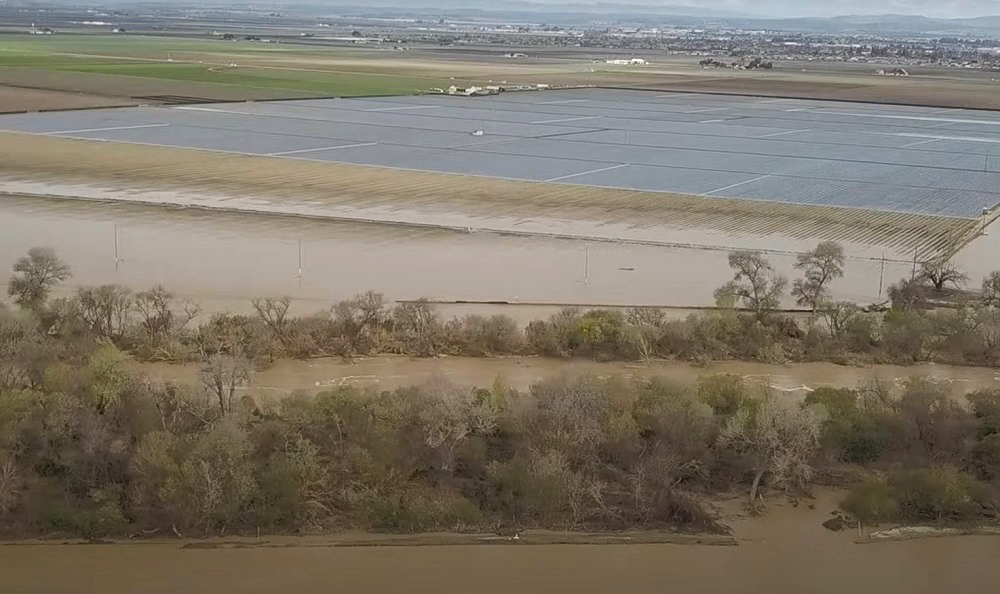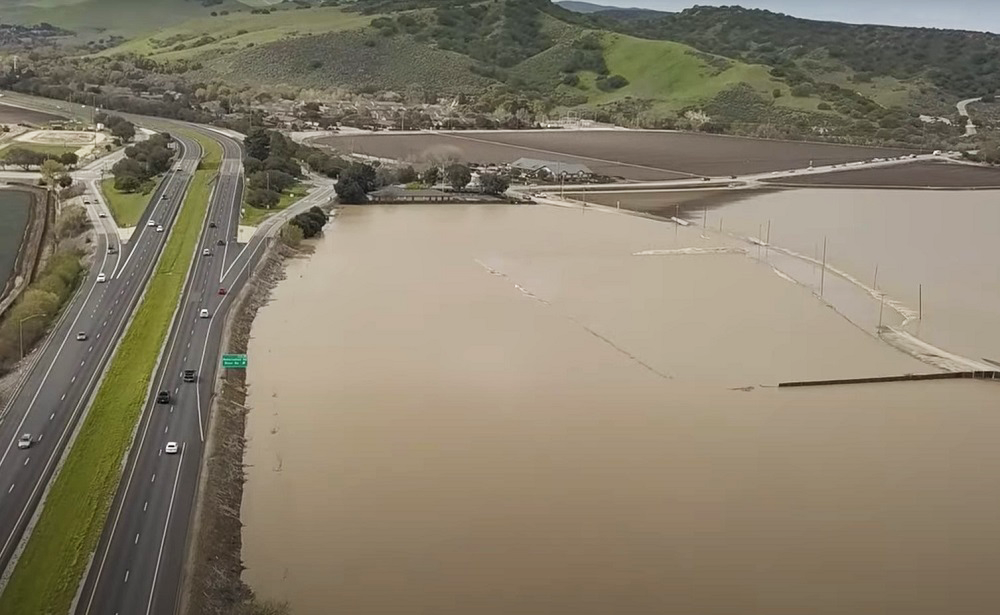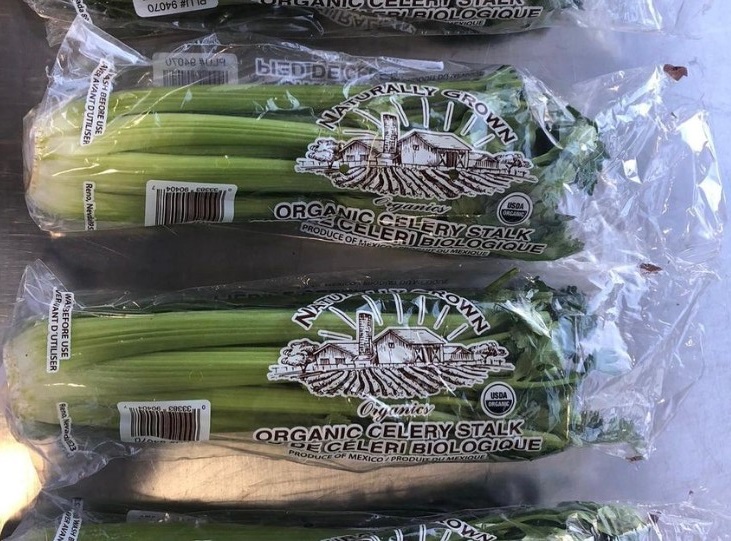During March, growers and shippers of organic fresh produce hope for a smooth and orderly transition from the desert areas of Mexico, California, and Arizona to the California Central Coast and the Salinas Valley. That is not going to be the case this year.

Markon's 'Live from the Fields' shows flooding in the Salinas Valley
From the northern growing fields of Monterey County near Pajaro to the southern county fields near San Ardo, growers have been dealing with historic flooding this week that is certainly going to disrupt normal production patterns for months on end.
Casey Mills, director of sales for Braga Fresh Family Farms, which markets the well-known Josie’s Organics brand, said that even with the transition in progress, the overall situation is difficult to grasp. “We are facing many unpredictable environmental factors that will likely cause supply disruptions across multiple commodities,” he said.
Casey Mills, Director of Sales, Braga Fresh Family Farms
The extended length of cold weather conditions this past winter in the Salinas Valley delayed crop growth, Mills said, which caused initial forecasted harvest dates to be behind schedule by 10-14 days, even before the current storms began to hit. “In addition, we have seen much higher than average rainfall in the region, causing the Salinas River to flood both in January and, most recently, this week in March,” he said.
“We are facing many unpredictable environmental factors that will likely cause supply disruptions across multiple commodities.” - Casey Mills
Crops not buried under water are far behind schedule, and those that were flooded will cause even more volume disruptions. “The consistently wet weather has caused numerous challenges, with the strongest impacts felt by growers facing limited ability to plant fields within previously anticipated timelines and decreased access due to lost acreage in flood zones,” Mills said.
Amazingly, Mills said, there are some crops that will be harvested in the coming days and weeks. “We anticipate initial Salinas yields to be lighter than expected for the first several plantings,” he said. “The commodities affected most specifically are the broccoli and cauliflower planted in November through December as these crops have experienced the longest period of exposure to the cold and wet conditions.”


Josie's Organics organic cauliflower and broccoli
Compounding the transition issue is the fact that desert production for Braga Fresh is going to end even earlier than expected. “As we close out the desert season, warm weather throughout the past week and a half has brought supplies forward on most commodities,” Mills said. “We are currently forecasting an earlier than anticipated finish to our season as a result.”
“The commodities affected most specifically are the broccoli and cauliflower planted in November through December as these crops have experienced the longest period of exposure to the cold and wet conditions.” - Casey Mills
This year, he said, is developing into “an especially unique spring transition time during the weeks ahead, but we are committed to working diligently as a team to navigate any and all challenges that may arise due to supply disruptions.”
Norm Groot, executive director of the Monterey County Farm Bureau, said that growers of flooded fields are facing time-consuming protocols to replant, which will further exacerbate the supply situation in the coming months.
Norm Groot, Executive Director, Monterey County Farm Bureau
The biggest issue, Groot said, is that food safety protocols require any crop on a field that is flooded to be discarded—it cannot be placed in commerce nor consumed.
“Once the water recedes, growers can begin the testing protocols that they have to pass before they can replant. When flooding occurred in January, we witnessed that it typically took 30 to 60 days to get through those protocols,” Groot said, adding that it took up to two weeks for the water to recede on some fields.
Photo taken February 4 by Monterey County Farm Bureau Executive Director Norm Groot while on tour in Monterey County with local representatives
That means some growers may need as long as 75 days or more to replant a flooded field.
“Once the water recedes, growers can begin the testing protocols that they have to pass before they can replant.” - Norm Groot
Speaking to OPN Connect earlier this week, Groot said the number of acres currently underwater will not be known for probably several weeks. “I can tell you that it is going to be much more than 15,000 acres that were flooded in January.”
Groot said formal surveys of landowners will probably begin next week (week of March 20) and take some time to complete.

Markon's 'Live from the Fields' shows flooding in the Salinas Valley
On the good news side, Groot did say that organic fields that have been flooded will not automatically lose their organic certification. Growers will not have to restart the three-year transition process.
Though the transition to the spring/summer Monterey County organic vegetable deal is going to be challenging, to say the least, there will be organic supplies from other areas. “I feel for my friends in the Salinas Valley,” said Darrell Beyer of Bluebird Mountain Organics in Reno, NV. “I was talking to some people over in Salinas today, and they are thinking they won’t have anything until June. Thankfully, my spring crops are in Ventura County.”
Darrell Beyer, Founding Partner, Bluebird Mountain Organics
Organic production in Mexico, Beyer said, is winding down over the next couple of weeks. “We are starting the transition next week, but there will be product from Mexico and the desert (California and Arizona) through March and into April,” he said. “Because of what’s happening in Salinas, growers are going to try to stretch their supplies as long as they can … until the quality just isn’t there.”
Beyer said the organic veg market will receive a much-needed uplift from the Salinas Valley challenges. “The market has been really funny,” he said. “There hasn’t been a lot of product, but there hasn’t been a lot of demand either. It hasn’t been a good market.”

Naturally Grown organic celery stalk
While Ventura County has not had the flooding that's being experienced in Monterey County, Beyer said there has been plenty of rain, which has caused some planting issues. “But from April through July, they should have pretty good volumes.”
“Because of what’s happening in Salinas, growers are going to try to stretch their supplies as long as they can … until the quality just isn’t there.” - Darrell Beyer
He added that the volume coming from Ventura County will be very much needed because he doesn’t think the winter production can last much longer. “Quality is still pretty good out of there [Yuma and Imperial Valley], but I don’t think it will last to April,” adding that “the [organic] market is going to go crazy.”






